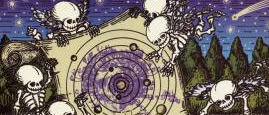By David Dodd
Here’s the plan—each week, I will blog about a different song, focusing, usually, on the lyrics, but also on some other aspects of the song, including its overall impact—a truly subjective thing. Therefore, the best part, I would hope, would not be anything in particular that I might have to say, but rather, the conversation that may happen via the comments over the course of time—and since all the posts will stay up, you can feel free to weigh in any time on any of the songs! With Grateful Dead lyrics, there’s always a new and different take on what they bring up for each listener, it seems. (I’ll consider requests for particular songs—just private message me!)
I know, it must seem like I am all sweetness and light and totally just, like, gaga over every single song in the band’s repertoire sometimes. But hey, I can be just as cynical and grumpy as the next picky Deadhead.
I admit it: I don’t like “Mason’s Children.”
But, for only about the fourth time ever, I received a request to blog about a particular song, and this was the selection. Sigh…. No—really! I love getting suggestions for songs to write about. So, here goes.
First off, my personal belief is that there is a good reason that the song, written and recorded for Workingman’s Dead, never made it onto the album. Its tone seems inconsistent with the rest of the suite of songs on that particular masterpiece. And, along with that, I think that its relatively short performance career with the band was, if not an intentional statement, at least well-advised.
Hunter’s note on the lyric in his A Box of Rain simply states: “An unrecorded GD song dealing obliquely with Altamont.”
Interestingly, while most of my sources credit the song to Garica / Hunter, it appears to be attributed, at least according to the Grateful Dead Family Discography, to Garcia / Lesh / Weir / Hunter. But regardless, I think it is basically a Garcia setting of Hunter’s lyric. (As always, I stand ready to be corrected!)
Perhaps the most likeable thing about the song is the somewhat hilarious range of interpretations you can find just by spending five minutes browsing the web. It’s about mushrooms, it’s about the Masonic order, it’s about cannibalism, it’s about loan sharks….you name it, pretty much, and this song is about it. Well, that is true of many of the best Dead songs, so why should “Mason’s Children” be any different? There’s even a rather persistent thread pertaining to the song’s “satanic overtures.” Overtones?
Anyway.
If Hunter says it was obliquely about Altamont, then clearly the statement made by “New Speedway Boogie” was far stronger, and not oblique.
Another fun thing about the song (I do look for the positive in everything) is the conscious use of a children’s nursery rhyme motif, in enumerating the days of the week. Hunter returns to this particular children’s motif on at least one occasion, in “Althea,” where he alludes to the rhyme:
Monday's child is fair of face,
Tuesday's child is full of grace,
Wednesday's child is full of woe,
Thursday's child has far to go,
Friday's child is loving and giving,
Saturday's child works hard for a living,
But the child who is born on the Sabbath Day
Is bonny and blithe and good and gay
So too with “Mason’s Children” where the entire week is counted off. Well, except for the weekend. No Saturday or Sunday. (“Mission in the Rain” uses Saturday and Sunday, but not the rest.) “Day Job” uses Sunday and Monday, as does “Corrina.” Hmmm.
And then there’s “Keep Rolling By.” Not a song I could sing you offhand, but speculation by Alex Allan as to the song’s composition seems to indicate that there’s a possibility it was actually an original song, rather than a traditional tune. Indeed, a search on the fairly exhaustive Digital Tradition folk song site reveals no results for “Keep Rolling By,” which has the following lines, sung simultaneously:
{Sunday, Monday, Tuesday, Wednesday, Thursday, Friday, Saturday ...
{Summer, winter, spring and fall
{Tick, tick, tick, tick ...
I do love the particular motif of referencing nursery rhymes in Hunter’s lyrics, which is encountered over and over. For me, hearing these phrases can bring me right back to being a child again, even when the context (Ashes, ashes, all fall down…) is dire.
“Mason’s Children” is dire, for sure. The story told by the song is disturbing, any way you look at it. Someone is bricked up in a wall, then disinterred, then possibly cooked in a stew and eaten. Some have suggested a reference to Robert Heinlein’s Stranger in a Strange Land, wherein the protagonist, Valentine Michael Smith, is boiled in a soup and consumed by his followers after his death.
I would love to hear a cogent story from anyone—oh heck—who cares about cogency? Let’s hear all the stories you might have that seem to come from these lyrics. This could be quite fun.
I’m sure there are those who love this song. I don’t mean to in any way denigrate that appreciation—as always, I really just want to point to a few angles, and throw it up for grabs for everyone to think about and chime in on.
Just don’t ask for “Day Job,” or “Money, Money,” ok?
dead comment
I admit, I love it
Masonry
i think scarcity breeds affection
Charley
One of the worst songs ever.......
I wonder why
DO WHAT?!?!?!
Brick Mason
the only version that I have heard that truly comes alive is...
A Great Rarity
Mason's Children
second that emotion!
Now wait a minute - Day Job ...
Day Job, Knowing History, etc.
Great Song, just the wrong band!
I like the
"I don't like the vocals particularly"
Love the Lyrics, "meh" about the performances
masons ....
Mason's Children
fare thee well mason's
Masons children
1970-02-28
So just today I stumbled across this show on Archive.org after doing a search for Alligator. In the comments some people were saying they heard Satisfaction in the beginning riffs. Another said Jumpin Jack Flash. To me it kinda sounds like both but it would make sense if Hunter said it is about Altamont. The Notes say it was the final rendition of Mason’s Children. That would make it even better, like they were saying “This is for you” to the ‘Stones and then they put it on the shelf.
Mason's Children Take
I love hearing this song from the band's early years. It seems to be a relatively simple song from a musical standpoint, and I wish they would have kept this in their rotation as a work in progress. In the 12-28-69 show (around the 8:20 mark until the end) it sounds like they're searching to bring it into something else, but it never gets fully going which makes me wonder how much further they could have expanded this song out.
But what really draws me in are the lyrics and the thoughts it provokes. Several things here to sort out. First, the title - Mason's Children. Children is not a young person, but a follower and there seems to be a thin line between a following and a cult in which the term children could stand for either. And Mason is a very close fit with Manson.....as in Charles Manson from California. From there I think of religion and the following Jesus had and the cult Charles Manson had. Both leaders with followers on the opposite ends of the spectrum; one spreading peace, love and tolerance while the other was spreading chaos, death and destruction.....you decide which is which.
On the religious side the lyrics make me think about Jesus dying on the cross, the celebration of Easter when he was buried and sealed in a cave and later emerged, the last supper, his appeal to his followers not to weep for him, that he was God's son sent to die for our sins.......read the lyrics and look for the hints of religion. I had also heard that Robert Hunter, who wrote this song, was very interested in theology which is present throughout other songs written by Hunter and put together musically by Jerry.
The original commentary suggests that this was written because of Altamont. Altamont took place on December 6, 1969. Mason's Children was "played between the middle of December 1969 and February 1970". If the middle of December is the 15th or 16th, that's 9 to 10 days to write the lyrics and put the music to the lyrics or vice versa. I'm sure songs have been written quicker but to me it makes more sense that it was developed after the Manson murders which took place in July and August of 1969.
The other thing that keeps you interested in this song is that lyrically it could mean several things, just as the nursery rhyme was pointed out along with other people's interpretation.
My last thought on this is why did the band stop playing this song? Did someone who had influence whisper in their ear that this song may hit too close to home........the Dead had the Merry Pranksters and were starting to get a small following of loyalists. Maybe they didn't want to draw the unnecessary eye of the law less than a year after the famous murder of Sharon Tate and others. Maybe the Dead just lost interest in the song & it was played out similar to New Potato Caboose.
Anyway, my 2 cents. Thanks for reading.





I love hearing this song from the band's early years. It seems to be a relatively simple song from a musical standpoint, and I wish they would have kept this in their rotation as a work in progress. In the 12-28-69 show (around the 8:20 mark until the end) it sounds like they're searching to bring it into something else, but it never gets fully going which makes me wonder how much further they could have expanded this song out.
But what really draws me in are the lyrics and the thoughts it provokes. Several things here to sort out. First, the title - Mason's Children. Children is not a young person, but a follower and there seems to be a thin line between a following and a cult in which the term children could stand for either. And Mason is a very close fit with Manson.....as in Charles Manson from California. From there I think of religion and the following Jesus had and the cult Charles Manson had. Both leaders with followers on the opposite ends of the spectrum; one spreading peace, love and tolerance while the other was spreading chaos, death and destruction.....you decide which is which.
On the religious side the lyrics make me think about Jesus dying on the cross, the celebration of Easter when he was buried and sealed in a cave and later emerged, the last supper, his appeal to his followers not to weep for him, that he was God's son sent to die for our sins.......read the lyrics and look for the hints of religion. I had also heard that Robert Hunter, who wrote this song, was very interested in theology which is present throughout other songs written by Hunter and put together musically by Jerry.
The original commentary suggests that this was written because of Altamont. Altamont took place on December 6, 1969. Mason's Children was "played between the middle of December 1969 and February 1970". If the middle of December is the 15th or 16th, that's 9 to 10 days to write the lyrics and put the music to the lyrics or vice versa. I'm sure songs have been written quicker but to me it makes more sense that it was developed after the Manson murders which took place in July and August of 1969.
The other thing that keeps you interested in this song is that lyrically it could mean several things, just as the nursery rhyme was pointed out along with other people's interpretation.
My last thought on this is why did the band stop playing this song? Did someone who had influence whisper in their ear that this song may hit too close to home........the Dead had the Merry Pranksters and were starting to get a small following of loyalists. Maybe they didn't want to draw the unnecessary eye of the law less than a year after the famous murder of Sharon Tate and others. Maybe the Dead just lost interest in the song & it was played out similar to New Potato Caboose.
Anyway, my 2 cents. Thanks for reading.
So just today I stumbled across this show on Archive.org after doing a search for Alligator. In the comments some people were saying they heard Satisfaction in the beginning riffs. Another said Jumpin Jack Flash. To me it kinda sounds like both but it would make sense if Hunter said it is about Altamont. The Notes say it was the final rendition of Mason’s Children. That would make it even better, like they were saying “This is for you” to the ‘Stones and then they put it on the shelf.